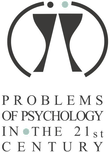MODERN CIVILIZATION THREATS AND THE QUALITY OF DIALOGUE IN FAMILY RELATIONSHIPS
| Title | MODERN CIVILIZATION THREATS AND THE QUALITY OF DIALOGUE IN FAMILY RELATIONSHIPS |
| Publication Type | Journal Article |
| Year of Publication | 2013 |
| Authors | Wąsiński, A, Szyszka, M |
| Journal | Problems of Psychology in the 21st Century |
| Volume | 7 |
| Start Page | 83-92 |
| Date Published | December/2013 |
| Type of Article | Original article |
| ISSN | 2029-8587 |
| Other Numbers | ICID: 1081469 |
| Keywords | civilization threats, factors of family disintegration, family as a community, open communication model |
| Abstract | In this study the authors discuss the issue of changes related to the integration and disintegration of family as regards the interaction of external factors listed among modern civilization threats. The authors assume that family is a special type of community life as compared to other forms of communities on various levels of social structure. It has a function to protect its members in the relations with the outside world, and at the same time it prepares them to take active part in the world and integrates them with what is outside. Coherence and durability of the family is in this context of key importance not only for development processes, quality and functioning of family members (both children and parents), but also for getting them ready to take up actions that contribute new values to the family life. |
| URL | http://oaji.net/articles/2014/444-1400504429.pdf |
| DOI | 10.33225/ppc/13.07.83 |
| Refereed Designation | Refereed |
| Full Text |
